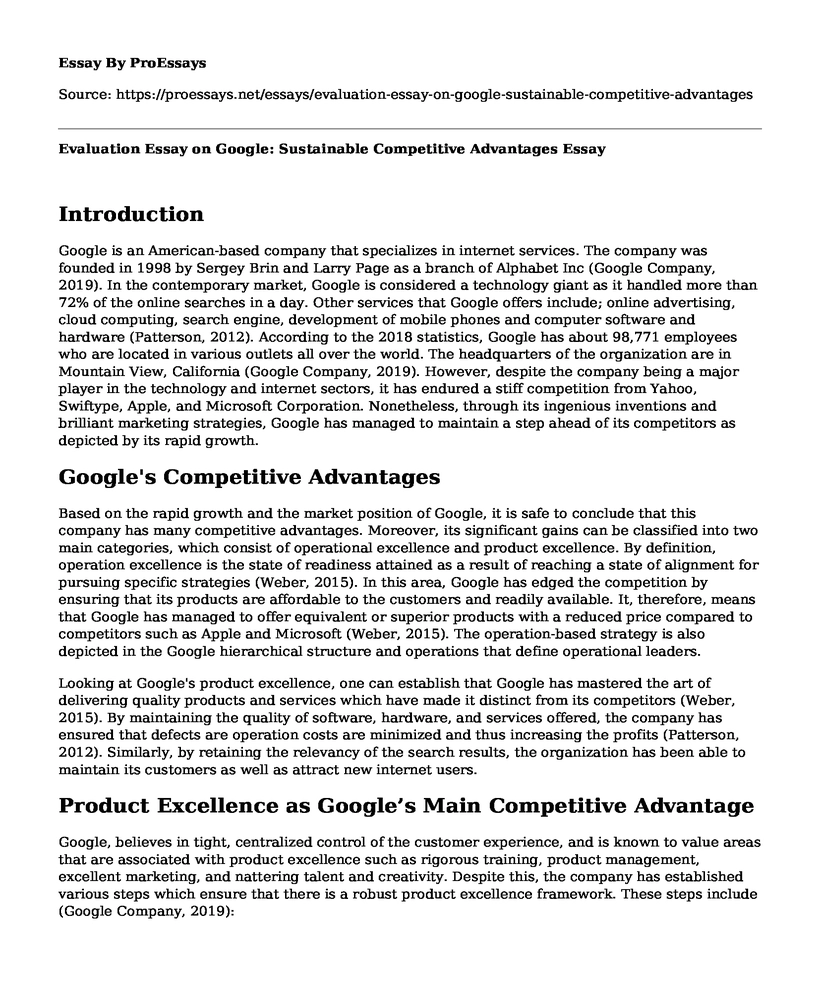Introduction
Google is an American-based company that specializes in internet services. The company was founded in 1998 by Sergey Brin and Larry Page as a branch of Alphabet Inc (Google Company, 2019). In the contemporary market, Google is considered a technology giant as it handled more than 72% of the online searches in a day. Other services that Google offers include; online advertising, cloud computing, search engine, development of mobile phones and computer software and hardware (Patterson, 2012). According to the 2018 statistics, Google has about 98,771 employees who are located in various outlets all over the world. The headquarters of the organization are in Mountain View, California (Google Company, 2019). However, despite the company being a major player in the technology and internet sectors, it has endured a stiff competition from Yahoo, Swiftype, Apple, and Microsoft Corporation. Nonetheless, through its ingenious inventions and brilliant marketing strategies, Google has managed to maintain a step ahead of its competitors as depicted by its rapid growth.
Google's Competitive Advantages
Based on the rapid growth and the market position of Google, it is safe to conclude that this company has many competitive advantages. Moreover, its significant gains can be classified into two main categories, which consist of operational excellence and product excellence. By definition, operation excellence is the state of readiness attained as a result of reaching a state of alignment for pursuing specific strategies (Weber, 2015). In this area, Google has edged the competition by ensuring that its products are affordable to the customers and readily available. It, therefore, means that Google has managed to offer equivalent or superior products with a reduced price compared to competitors such as Apple and Microsoft (Weber, 2015). The operation-based strategy is also depicted in the Google hierarchical structure and operations that define operational leaders.
Looking at Google's product excellence, one can establish that Google has mastered the art of delivering quality products and services which have made it distinct from its competitors (Weber, 2015). By maintaining the quality of software, hardware, and services offered, the company has ensured that defects are operation costs are minimized and thus increasing the profits (Patterson, 2012). Similarly, by retaining the relevancy of the search results, the organization has been able to maintain its customers as well as attract new internet users.
Product Excellence as Google’s Main Competitive Advantage
Google, believes in tight, centralized control of the customer experience, and is known to value areas that are associated with product excellence such as rigorous training, product management, excellent marketing, and nattering talent and creativity. Despite this, the company has established various steps which ensure that there is a robust product excellence framework. These steps include (Google Company, 2019):
- Knowing your users - Avoid biases and establish communication with the users.
- Critical user journeys - description of the path users need to take to achieve a goal
- Prioritization - the step involves empathizing with users and getting feedback from them.
- Pitfalls - this area checks for user choices, feedback, consistency, language, performance, aesthetics, ergonomics, and errors in the programs and services provided (Google Company, 2019).
- Product excellence principles - these are the shared values and beliefs that are analogous to google design patterns. They include; focused utility, simple design, and crafted execution (Weber, 2015).
- Measurement - this entails a plan that fits the desired goals
Conclusion
In conclusion, product excellence has been the backbone that has enabled Google to survive in a very comparative industry. It can be seen that through the years, Google leadership has recognized that excellence in creativity, problem-solving, and teamwork is vital to the success of the company.References
Google Company. (2019, May 2). About. Retrieved from https://www.google.com/intl/en/about/company/
Patterson, M. R. (2012). Google and Search Engine Market Power. SSRN Electronic Journal. doi:10.2139/ssrn.2047047
Weber, J. (2015). Google Tag Manager and Google Analytics APIs. Practical Google Analytics and Google Tag Manager for Developers, 257-263. doi:10.1007/978-1-4842-0265-4_16
Weber, J. (2015). Using Google Analytics with BigQuery for Big Data Analysis. Practical Google Analytics and Google Tag Manager for Developers, 237-255. doi:10.1007/978-1-4842-0265-4_15
Cite this page
Evaluation Essay on Google: Sustainable Competitive Advantages. (2022, Mar 07). Retrieved from https://proessays.net/essays/evaluation-essay-on-google-sustainable-competitive-advantages
If you are the original author of this essay and no longer wish to have it published on the ProEssays website, please click below to request its removal:
- Technology Journey
- My Experience With Digital World Essay Example
- Essay Sample on Internet Addiction
- Essay Example on Parents: Helping Your College-Going Child Tackle Internet Addiction
- Paper Example on Company Transitions to Big Data: Reducing Costs With Hadoop
- Paper Example on GPS: How the US DoD's Technology Became a Global Asset
- Essay Example on Founders of Tastemade App: Steven Kydd & Joe Perez







